As Requested By Quite A Few People - A Masterpost Of Educational Podcasts. Links Go To Either The Site

as requested by quite a few people - a masterpost of educational podcasts. links go to either the site or the itunes podcast store. an excerpt of the description is included with each.
* indicates a podcast that i listen to regularly
entertainment
*welcome to night vale - twice-monthly updates for the small desert town of night vale
*muggle cast - everything harry potter
general information
radiolab - investigation told through sounds and stories, and centered around one big idea
*stuff you should know - about everything from genes to the galapagos
*stuff mom never told you - the business of being women
tedtalks
good job, brain - part pub quiz show, part offbeat news
news
no one knows anything - the politics podcast from buzzfeed news
wait wait…don’t tell me - weekly current events quiz
college
*college info geek - the strategies and tactics the best students use
*getting in - your college admissions companion
math
math for primates - a couple of monkeys who decided that arguing about mathematics was a better use of their time than throwing poo at one another
math mutation - fun, interesting, or just plain weird corners of mathematics
science
60 second health - latest health and medical news
the naked scientists - interviews with top scientists, hands-on science experiments
60 second science - the most interesting developments in the world of science
startalk - astronomy, physics, and everything else about life in the universe
nasa science cast - science behind discoveries on earth, the solar system, and beyond
history
*myths and legends - myths, legends, and folklore that have shaped cultures
stuff you missed in history class - the greatest and strangest stuff you missed
the podcast history of our world - from the big bang to the modern age! …eventually
witness - the story of our times told by the people who were there
the history chicks - two women. half the population. several thousands years of history.
entrepreneurship & finances
practical money matters - better managing their finances
the internet business mastery - learn how to create an internet based business
social triggers insider - the fields of psychology and human behavior
listen money matters - honest and uncensored, this is not your father’s boring finance show
writing & literature
professional book nerds - it’s our job to discuss books all day long
a way with words - words, language, and how we use them
grammar girl - short, friendly tips to improve your writing
classic poetry aloud - recordings of the greats poems of the past
language
esl (english) - improve english speaking and listening skills
language pod
coffee break
search in your podcast app for specific languages!
art
99% invisible - exploration of the process and power of design
tips and tricks photography
the arts roundtable
hobbies & other
stash & burn (knitting)
practical defense - staying safe in our increasingly dangerous urban environments
zen and the art of triathlon - a triathlete’s view on living the multisport life
the art of charm - make you a better networker, connecter, and thinker
the indoor kids - isn’t just about video games, isn’t not about video games
rationally speaking - explore the borderlands between reason and nonsense
the dice tower - board games, card games, and the people who design and play them
motivational & inspirational
back to work - productivity, communication, work, barriers, constraints, tools, and more
personal growth podcast - classic and contemporary self development audio
what it takes - conversations with towering figures in almost every field
here be monsters - exploring the dark corners of the human mind
on being - the big questions of meaning with scientists, theologians, artists, teachers
More Posts from Swirlspill-study and Others
How to Read From a Textbook
Hi guys! So I’ve noticed that a lot of people, including myself, struggle with reading directly from a textbook and actually retaining all of the information.
Well my friends I am here to change that [queue the victory music]. Recently I discovered a reading strategy known as the SQ3R technique. It stands for Survey, Question, Read, Recite, Review. I’ve found this technique to be extremely helpful when it comes to reading through textbooks, and so now I’m passing this information onto my dear followers.
1. Survey
The first step in this process is to get a basic idea of what you’re going to be reading. Most textbooks have chapter outlines or a brief summary at the beginning of each chapter. Take about five minutes to skim through these. By doing this, you’ll have the basic structure of what you’ll be learning in your head.
2. Question
This step will be repeated multiple times throughout your reading, so pay attention! Within each chapter, there are section titles that give you a vague idea of what the next few paragraphs will be about. This step asks that you turn the section title into a question. For example, we’ll say that our section title is “The Changing Role of the States.” You can turn this into questions such as “how did the role of the states change” and “which states changed and how.” When you turn the titles into questions, you end up looking for the answers while you’re reading rather than simply reading. This stops you from reading the same line over and over again.
3. Read
This one’s the obvious one. Read your textbook. Take notes while you’re reading. Write down all the important definitions, concepts, names, dates, etc. But remember to take breaks! Taking a three minute break for every twenty minutes of reading allows information to settle in your brain. It also helps with memory retention.
4. Recite
I’ll admit I’m still a bit uncomfortable with this step but it’s helped me a lot with remembering what I’ve read. Basically, this step asks you to summarize what you’ve just read out loud. I do this after each section, and then I summarize the whole chapter once I’ve finished the chapter. (Pro Tip: If you’re uncomfortable with talking to yourself, try talking to a recording device or summarize to a nearby friend.)
5. Review
Review, review, review. I cannot stress this enough. Read over your notes the day after, then the week after. Studies show that you remember 60% more of the material you learned when you review it the next day. Don’t forget you can review with more than just your notes! Make flashcards or foldables with the most important information in the chapter and quiz yourself! So many textbooks have quizzes online for each chapter, so use them!!!! I find mind maps to be super helpful in studying too. Reviewing is a super important step, so don’t think that you can forget about studying just because you’ve read through a chapter!
I might include that, as of recent, many professors have been saying that there is a fourth ‘R’ to this process: Relate. With this step you simply relate the information you’ve just read back to something important in your life. When you make connections with your reading, it becomes easier to remember the material.
Well that’s all I’ve got for you guys for now. I hope this helps at least a few of you. Keep on studying guys, and good luck on finals! ╚(•⌂•)╝








did some review for our botany quiz on monday! i accidentally fell asleep throughout the entirety of our teacher’s three-hour lecture, but thank the heavens for powerpoint presentations aaaa

Researching for a project? Looking for open-access, high quality databases, encyclopedias and resources to help you write your next paper? Here’s a list of some great ones to help you find exactly what you were looking for.
Research Managers
Zotero
Mendeley
Qiqqa
General
List of academic databases and search engines
Our World in Data
Search Engines
100 Time-Saving Search Engines for Serious Scholars
Top 11 Trusted (And Free) Search Engines For Scientific and Academic Research
Ten search engines for researchers that go beyond Google
12 Fabulous Academic Search Engines
The 6 BEST Search Engines for Academic Research
20 of the Best Search Engines for Students
Best Educational Search Engines For Academic Researchers
Databases
Directory of Open Access Journals
New York Public Library Articles and Databases
UCSB Article Indexes & Research Databases
DATABASES: Library of Congress E-Resources Online Catalog
FINDING CURRENT RESEARCH USING FREE ONLINE RESOURCES
Free Databases for Magazine/Journal Articles, etc.
Free Full-Text Resources for Grad School Papers
Online Reference: Open Access Databases
Free Online Full-text Articles
Free scholarly resources
International Education Research Database
PubMed
Sci-Hub
Database checklist: Key academic research resources — both free and restricted
Research Databases and Other Online Tools
Encyclopedias
Top Encyclopedia Sites for Student Research Papers
RefSeek’s Encyclopedias
Encyclopedia.com
Infoplease
Internet Encyclopedia of Philosophy
Medline Plus
Dictionaries
RefSeek’s dictionaries and thesauri
The 10 Best Online Dictionaries
Essay and Paper Writing
Essay and Paper Writing Masterpost
Hello, lovelies! This week, I talk about how I got a 2300+ on the SAT without any outside tutoring or prep classes. Yes, it’s possible, and I tell you how to do it in the video.
I also put together a masterpost of resources below. Even if you aren’t self-studying, a lot of these things might be helpful:
PREP BOOKS
Official College Board SAT Study Guide (The Blue Book)
Direct Hits Vocabulary (Volume 1) // Direct Hits Vocabulary (Volume 2) — What makes these books stand out from other SAT vocab books is the use of pop culture references to explain definitions. For example, the first word in Volume 1, ambivalent, is given the sentence: “In The Avengers, Tony Stark, Steve Rogers, Bruce Banner, and Thor are initially ambivalent about joining S.H.I.E.L.D.’s Avengers Initiative.”
Barrons SAT 2400 — Fabulous book, helpful strategies. I didn’t read the whole thing or do all the practice problems; I only used it for extra help on the sections I struggled with.
Grubers SAT 2400 — Didn’t personally use it myself, but it was recommended by a lot of my friends.
CRITICAL READING
→ Non-SAT Critical Reading Advice
→ My favorite reading sources:
The Atlantic — mix of interesting articles
Variety — pop culture focus, but with more cultured language
New Yorker — very cultured, good place to pick up vocabulary
New York Times — classic SAT reading material
Boston Globe — I have a soft spot in my heart for their entertainment and style sections
National Geographic — exactly the sort of passages you’ll find on the SAT
→ Vocab Flashcards (mentioned in video)
WRITING
→ Top Writing Errors
→ Top Grammar Rules
MATHEMATICS
→ Khan Academy

september 26th 2017 | 2/100 days of productivity
my quarterly exams are finally over!! woo^^ test scores come out tomorrow tho huhuhu i’m not sure how to feel about it but i think i did pretty decently! hope my grades are doing well :3
meanwhile, entrance exams are just around the corner… guess who hasnt started yet? yup that’s right! me lol 😂 tbh idk how y'all do it? share me your secrets!!
calling out any fellow procrastinators out there! wanna procrastinate together? 😂😂
what i’m currently in love with : breathe again by emily slough ( @emslough on wattpad!! she’s awesome i love her so much omg )
hi chelsea!! i'm an undergrad student right now, considering a career in academia. my adviser and all my professors tell me i have a lot of potential and i love the idea of spending my life teaching and doing research, but i've read so many horror stories about people trying to find & keep jobs and eventually leaving academia. i was wondering if you had any insight or advice, maybe even places where i could find a more positive & encouraging (but still realistic) perspective. thank u!!
i’m not sure i’m in a great place to answer this for you! the realistic picture is just… not encouraging. finding someone who’ll say “of course you’re going to get a job!” might make you feel better temporarily, but that person is lying to you, and the lie is going to come back around and hurt worse in five years or so.
in other words, the horror stories are ubiquitous because the experience is ubiquitous (and tbh, though quit lit has def blossomed over the last few years, there’s still a far greater number of people leaving academia than are represented in those accounts–many people see leaving as “washing out” or admitting defeat, and don’t talk about their decisions to go).
this is not to say that you shouldn’t go into academia. but as i tell my own mentees, you should not go into academia with the expectation of getting a job at the end. i went into grad school because i liked doing the work, and because i did some self-assessment and concluded that even if i didn’t leave six years later with a tenure-track teaching job, i wouldn’t regret taking the time & doing the work to get the doctorate. then i sat down and had a little chat with myself two-ish years ago and decided that yes, i was going to Go For It, which has meant avoiding quit lit for my own mental health and focusing on the positives (your professors! those are the extant examples of people who got the kind of research & teaching job you want!). asking your advisors about this directly is a great place to start; you can also read karen kelsky’s the professor is in, which i’ve mentioned here a few times, for a fairly realistic description of what the market is like at the moment.
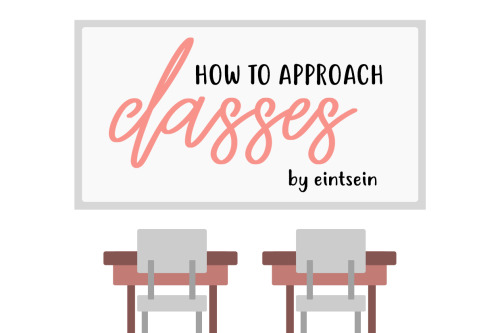
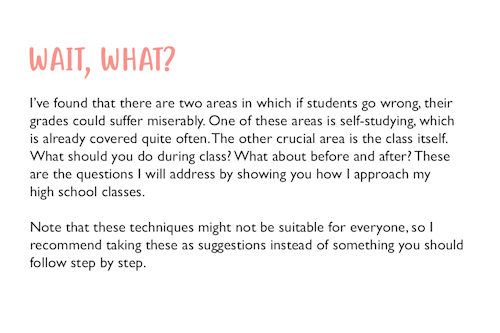
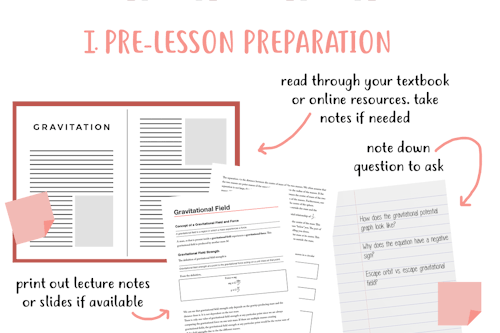
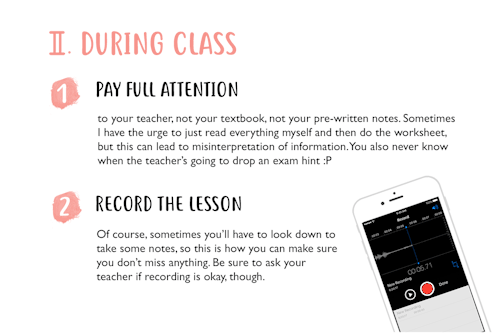
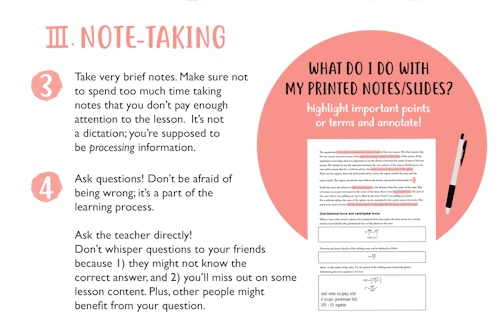
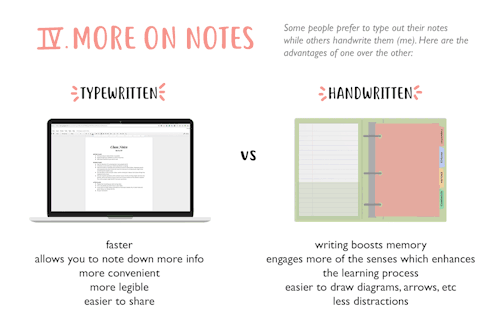
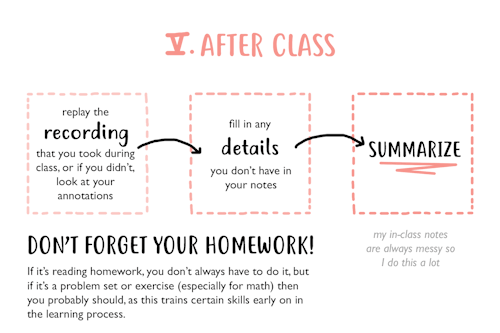
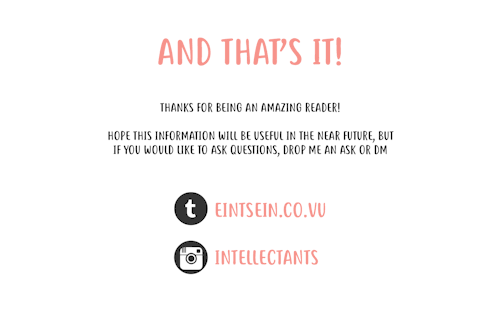
HOW TO APPROACH CLASSES A guide to getting the most out of your classes and lectures
By Eintsein
Design inspired by this post by @journalsanctuary
the no bullshit guide to getting your shit together: for the lazy student
Let’s be honest: time management and organization? They’re really hard. Sure, at first you might feel like you’ve gotten the hang of them, that you’re in control of your life. But how often have you fallen off the wagon? Procrastinated on one thing and the next moment, you’re behind in all your classes? I know that sometimes laziness feels like a part of who you are, but honestly, fuck that. Do you really want to give up your success for the disinterest of a moment?
If your answer is no (it better be no, or you really need to get your priorities straight), let’s get to it.
STEP ONE: BE HONEST WITH YOURSELF
“This class doesn’t even matter.” “I don’t care about my grades.” “I can finish this the day before.” Sound familiar? You might feel great now, but when you’re staring down at your report card later, it’ll feel like you just got punched.
This is a cliche, but the greatest obstacle to your success is yourself - especially the lies you tell yourself! Sit yourself down and be honest about what you need to improve on. Be as blunt as you can, but for god’s sake, don’t throw yourself a pity party! There’s no use agonizing over what you can’t change. Instead, set realistic, achievable goals, and make a game plan. Struggling with math? Go to extra help. Behind in all your classes? Stay in for a couple nights and actually work.
STEP TWO: STOP WITH THE FANCY SHIT
Now you know what your goals are, but maybe you want some inspiration, so you log on to tumblr and are instantly bombarded by all these beautiful, well lit shots of the most gorgeous bullet journals, planners, and notes. Impressive, right? Well, I’m gonna let you in on a little secret: they’re all useless! A simple phone planner works just as well, if not better, than a fancy agenda, because you’ll always have it on you, it’s not a hassle to carry around, and you don’t feel obligated to make it look pretty.
Riddle me this, where are you going to find all this extra motivation to keep prettying up your bullet journal? To write all your notes in perfect, colour coded printing? There aren’t many times in life where taking the easy was out will actually benefit you, so take advantage! Stop wasting your time; get a phone planner and write your notes in your natural goddamn handwriting.
STEP THREE: CLEAN YOUR ROOM
Yep, your entire room - not just your study space! This one can be put on the back burner for a bit if you’re on a really pressing deadline, but I wouldn’t recommend it. I’m notoriously messy, and if I don’t watch myself, I’d find myself in dirty-laundry-and-old-notes hell. A little bit of organized chaos is fine, I even encourage it! But try working when your desk is covered in mounds of paper and you have nowhere to put your laptop – it’s just not conducive to success.
Keeping your entire room clean is a way to stave off stress, frustration, and even embarrassment, because nobody wants to show potential roommates how much of a mess they are.
STEP FOUR: ACTUALLY WORK
Yeah, I know what you’re thinking: “actually work? Who does this girl think she is?” I’d probably think the same thing, except I’ve learned the valuable lesson of sucking it the hell up, and you will too. When you get home from work, grab a snack and work. When you have a free period, figure out what’s due and work. Stop reasoning yourself out of work: you’re not going to finish this later, and that will be on the test. There’s really not much to say about this one, because it’s the step that requires the most raw effort, and you’re really only going to find that within yourself. Tell yourself what’s at stake, and realize that, by setting the standard for your mediocrity now, you’re potentially trapping yourself in a cycle that will last for years.
STEP FIVE: CUT YOURSELF SOME SLACK
Maybe you’ve been on top of your shit for a day, a week, or even a month, and that’s really great. But then… you fail. You miss a deadline or you bomb a test. So what do you do now? Do you allow yourself to fall back into your old habits? Fuck no! Everyone fails, even that studyblr with those perfect bullet journal photos and a perpetually clean study space. I’m going to tell you something that’ll sound really strange: you should value your failures, especially if you worked hard to avoid them. What?! Be HAPPY about failing when I actually TRIED? Yeah, you heard me right. If you don’t know how to handle failure, then when you inevitably experience it, your reaction will be much worse.
Failing hurts, and boy, I know how embarrassing it can be. But learning how to deal with failure, and especially how to keep trying after it happens, is an invaluable lesson.
STEP SIX: TREAT. YO. SELF.
Disclaimer: I’m not suggesting you treat yourself after the most basic of tasks, because please. Treat yourself when you know you goddamn well deserve it. Remember that “all work and no play makes jack a dull boy.” If all you do is study and do your homework, then, pardon my french, your life sucks. If you don’t have friends, play a video game! Eat an entire jumbo chocolate bar! Indulge in whatever the fuck you want, you deserve it. I’m someone that has trouble prioritizing future benefits over immediate gratification, so by allowing myself little pleasures, I save myself from crashing and burning.
Hope these tips helped, but remember to take them with a grain of salt - you’re you and I’m me, and different things work for different people. Good luck!
-
 rainbow-powers liked this · 3 months ago
rainbow-powers liked this · 3 months ago -
 blackprincessr reblogged this · 6 months ago
blackprincessr reblogged this · 6 months ago -
 aurorsworld liked this · 6 months ago
aurorsworld liked this · 6 months ago -
 magic-poppets reblogged this · 9 months ago
magic-poppets reblogged this · 9 months ago -
 things-tokeepinmind reblogged this · 9 months ago
things-tokeepinmind reblogged this · 9 months ago -
 stdyhallblues reblogged this · 10 months ago
stdyhallblues reblogged this · 10 months ago -
 maellebvd liked this · 1 year ago
maellebvd liked this · 1 year ago -
 jstadelulu liked this · 1 year ago
jstadelulu liked this · 1 year ago -
 melifluuslove liked this · 1 year ago
melifluuslove liked this · 1 year ago -
 melifluuslove reblogged this · 1 year ago
melifluuslove reblogged this · 1 year ago -
 elysiananathema reblogged this · 1 year ago
elysiananathema reblogged this · 1 year ago -
 zoowweeee reblogged this · 1 year ago
zoowweeee reblogged this · 1 year ago -
 jjojongie liked this · 1 year ago
jjojongie liked this · 1 year ago -
 fluffy-crimp liked this · 1 year ago
fluffy-crimp liked this · 1 year ago -
 wisteria-waves liked this · 1 year ago
wisteria-waves liked this · 1 year ago -
 freshouttathedryer liked this · 1 year ago
freshouttathedryer liked this · 1 year ago -
 amucmalquicrim liked this · 1 year ago
amucmalquicrim liked this · 1 year ago -
 hozierisgod liked this · 1 year ago
hozierisgod liked this · 1 year ago -
 wardfitdejungstin liked this · 1 year ago
wardfitdejungstin liked this · 1 year ago -
 licpectncacavtran liked this · 1 year ago
licpectncacavtran liked this · 1 year ago -
 mydarlingrex liked this · 1 year ago
mydarlingrex liked this · 1 year ago -
 glenenelwethough liked this · 1 year ago
glenenelwethough liked this · 1 year ago -
 tioplanthescu liked this · 1 year ago
tioplanthescu liked this · 1 year ago -
 nadjem-mari liked this · 1 year ago
nadjem-mari liked this · 1 year ago -
 rebelarkey reblogged this · 1 year ago
rebelarkey reblogged this · 1 year ago
a study blog for collected references, advice, and inspiration
267 posts

